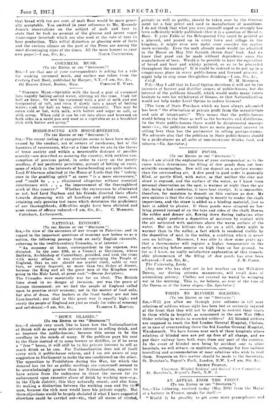" DOWN GLASSES."
[To THE EDITOR. QP :THE "SPECTATOR.") Sae,—I should vary much like to know how the Nationalization of Drink will do away with -private interest in selling drink, and so improve the public-houses; because this seems to be the corollary in the minds of many. If the publican pays his rent to the State instead of to some brewer or distiller, or if he owns a "free" house, it will still be to his private interest to sell as much drink as he can. For Nationalization does not of itself carry with it public-house reform, and I am not aware of any .suggestion in Parliament to make the one eonditional on the other. The opposition to Prohibition during the War, for which the demand has (so far as public meetings are concerned) seemed to be overwhelmingly greater than for Nationalization, appears to have arisen from the endeavour to throw the reason for its enforcement upon excessive abuse of drink by working men--e.g., in the Clyde district; this they naturally resent; and also from its making a distinction between the working man and the rich man, because the rich man would have his private supply. But -these objections would be largely obviated if what I have suggested elsewhere could -be carried out—viz., that all stores of alcohol, private as well as public, should be taken over by the Govern- ment (at a fair price) and used in manufacture of munitions. I do not think that what you have yourself urged so strongly has been sufficiently widely published—that it is a question of Bread r. Beer. If your Fable of the Beleaguered City could be printed as a placard, and posted up in every town and village in the kingdom, it might even now make some consider the matter more seriously. Even the malt already made would (as admitted in the House on May 7th) furnish eleven days' food. And we know that yeast can be made without dependence upon tho manufacture of beer. Would it be possible to have the equivalent of bread and beer and whisky printed, so as to be placarded throughout the country? If it could be ordered to be.put up in a conspicuous place in every public-house and licensed grocery, it might help to stop some thoughtless drinking.--I am, Sir, &c.,
P.S.-3fay I add that in Local Option decisions it will not be the interests of brewer and distiller owners of public-houses, but the interest of the publican himself, which would make many voters hesitate to vote for withdrawal of licence, so that Nationalization would not help under Local Option to reduce licences?
[The form of State Purchase which we have always advocated has been " the elimination of private profit from the manufacture and sale of intoxicants:" This means that the public-houses would belong to the State as well as the breweries and distilleries. Iii the State public-houses there would be disinterested manage- ment—i.e., the publican would have no more personal interest in selling beer than has the postmaster in selling postage-stamps. We advocate also that the publican in State public-houses should be a profit-sharer on all sales of non-intoxicant drinks, food, and tobacco.—Ea. Spectator.]


























 Previous page
Previous page